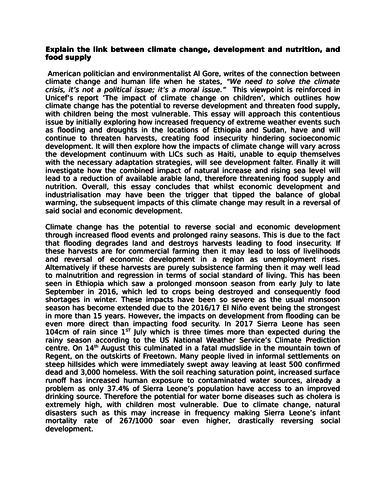
Explain the link between climate change, development and nutrition, and food supply
American politician and environmentalist Al Gore, writes of the connection between climate change and human life when he states, “We need to solve the climate crisis, it’s not a political issue; it’s a moral issue.” This viewpoint is reinforced in Unicef’s report ‘The impact of climate change on children’, which outlines how climate change has the potential to reverse development and threaten food supply, with children being the most vulnerable. This essay will approach this contentious issue by initially exploring how increased frequency of extreme weather events such as flooding and droughts in the locations of Ethiopia and Sudan, have and will continue to threaten harvests, creating food insecurity hindering socioeconomic development. It will then explore how the impacts of climate change will vary across the development continuum with LICs such as Haiti, unable to equip themselves with the necessary adaptation strategies, will see development falter. Finally it will investigate how the combined impact of natural increase and rising sea level will lead to a reduction of available arable land, therefore threatening food supply and nutrition. Overall, this essay concludes that whilst economic development and industrialisation may have been the trigger that tipped the balance of global warming, the subsequent impacts of this climate change may result in a reversal of said social and economic development.
American politician and environmentalist Al Gore, writes of the connection between climate change and human life when he states, “We need to solve the climate crisis, it’s not a political issue; it’s a moral issue.” This viewpoint is reinforced in Unicef’s report ‘The impact of climate change on children’, which outlines how climate change has the potential to reverse development and threaten food supply, with children being the most vulnerable. This essay will approach this contentious issue by initially exploring how increased frequency of extreme weather events such as flooding and droughts in the locations of Ethiopia and Sudan, have and will continue to threaten harvests, creating food insecurity hindering socioeconomic development. It will then explore how the impacts of climate change will vary across the development continuum with LICs such as Haiti, unable to equip themselves with the necessary adaptation strategies, will see development falter. Finally it will investigate how the combined impact of natural increase and rising sea level will lead to a reduction of available arable land, therefore threatening food supply and nutrition. Overall, this essay concludes that whilst economic development and industrialisation may have been the trigger that tipped the balance of global warming, the subsequent impacts of this climate change may result in a reversal of said social and economic development.
Something went wrong, please try again later.
This resource hasn't been reviewed yet
To ensure quality for our reviews, only customers who have purchased this resource can review it
Report this resourceto let us know if it violates our terms and conditions.
Our customer service team will review your report and will be in touch.
£2.00
